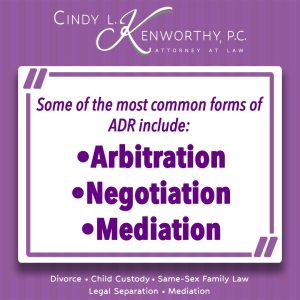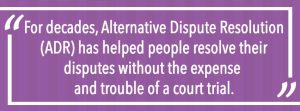Divorce is challenging. Even divorcing couples with the best of intentions often find themselves at odds about issues such as finances, custody, and division of assets.
 The last thing you need is the expense and stress of litigation, not to mention the fact that litigation can drag on for months (or even years); instead, many divorcing couples turn to mediation to come to a fair agreement. In any case that will require more than two hours of court time, most courts now order the parties to mediation.
The last thing you need is the expense and stress of litigation, not to mention the fact that litigation can drag on for months (or even years); instead, many divorcing couples turn to mediation to come to a fair agreement. In any case that will require more than two hours of court time, most courts now order the parties to mediation.
What is mediation, and how does it work in the state of Indiana? What should you expect in your divorce mediation? Read on to learn more.
 What is Divorce Mediation?
What is Divorce Mediation?
For decades, Alternative Dispute Resolution (ADR) in Indiana has helped parties resolve their disputes without the expense and emotional trauma of a court trial.
Some of the most common forms of ADR include:
- Arbitration
- Informal negotiation
- Mediation
Mediation is one of the most popular forms of ADR, commonly utilized to help divorcing couples reach an agreement without the formality of a court hearing. A professionally trained neutral third party, known as a mediator, is hired to meet with the parties, and their attorneys, and help them come to a mutually agreeable outcome.
In Indiana, the parties can choose to pursue mediation or mediation can be ordered by the court. Mediation may occur at any stage of the divorce process.
Ideally, this carefully structured process should ensure that disagreements are resolved and every party feels that their issues have been addressed.
What Does a Mediator for Divorce Do?
 Unlike a judge, a mediator isn’t authorized to make final decisions. Instead, mediators work with the parties to ensure that all issues are considered and equitable decisions are made.
Unlike a judge, a mediator isn’t authorized to make final decisions. Instead, mediators work with the parties to ensure that all issues are considered and equitable decisions are made.
While there aren’t any national requirements or credentialing needed to become a mediator, Indiana mediators must meet training requirements outlined by the Indiana Supreme Court and receive the Court’s approval to be listed on the Directory of Registered Mediators.
Mediators for divorce are completely neutral and are obligated to keep anything they learn throughout mediation completely confidential. Their experience and impartiality help foster a spirit of collaboration, cooling down a potentially adversarial relationship and help both parties consider more creative solutions that will take the needs of all the members of the family into consideration.
Why Should You Consider Divorce Mediation in Indiana?
Obviously, if your mediation is court-ordered, there’s no choice in the matter. Mediation isn’t an option, but a command.
But even if mediation isn’t ordered by a judge, mediation can be beneficial. Mediation can provide a sense of control at a time when everything feels upside-down and out of control.
Mediation is less formal than a traditional court appearance, allowing you and the other party to find creative solutions that will best suit your specific situation. If you share children, mediation can help establish a more positive working relationship that will benefit everyone in the long run. Mediation may also more efficient than a divorce trial, because it expedites a painful and unpleasant process.
Of course, it’s important to note that mediation isn’t for everyone. There are circumstances in which mediation may be unsafe, if not downright dangerous. An experienced divorce attorney can help you determine if mediation is right for you.
What Do You Need to Prepare for Mediation?
Like any other legal matter, preparation is key for mediation. Before you meet with your mediator, you should collect any pertinent financial information, such as your bank statements, tax returns, and any other documentation related to your assets and income.
You should also consider creating a budget, so you can answer any questions about your expenses quickly and easily. If you have any disputes related to your children, you should provide any documentation to your attorney for that as well.
One of the most important things you can bring to your mediation is a willing attitude. When you are prepared to enter into a good-faith compromise with the other party, mediation is far more likely to be successful. This isn’t a time for you to rehash the relationship; it’s an opportunity to focus on the relevant issues and come to an agreement.
What Does the Divorce Mediation Process Look Like?
 The divorce process can be overwhelming, but your attorney can help you understand what to expect in divorce mediation. Indiana is home to Cindy L. Kenworthy, P.C., who has performed the services of a divorce mediator.
The divorce process can be overwhelming, but your attorney can help you understand what to expect in divorce mediation. Indiana is home to Cindy L. Kenworthy, P.C., who has performed the services of a divorce mediator.
Before mediation, you and your attorney will meet to prepare a statement to give your mediator the information they need to start the process. This is your opportunity to lay out the facts and provide context to your case. You should also work with your attorney to create a list of the issues you want to address through mediation.
Typically, mediation doesn’t mean that you and your spouse will be in the same room. Each party and their attorney are put in different rooms (in person or virtual) and the mediator will travel back and forth between them. At certain points in the process, the mediator may bring the two attorneys together, but an effort is made to limit contact between the divorcing parties.
The mediation process can be lengthy, and if the mediator feels that the parties would benefit from an additional session, mediators are authorized to require that the parties meet again. Ideally, by the end of the process, both parties will hopefully come to an agreement. At that time, everything agreed upon will be written down and signed by the parties and their attorneys. Once signed, the mediator will file the agreement with the Court, and once approved by the Court, the agreement is the law of the case until further order of the court.
Cindy L. Kenworthy, P.C. Can Help
Unfortunately, mediation isn’t always successful. As an attorney, Cindy L. Kenworthy, P.C. will help you determine whether you should pursue further mediation or pivot to a hearing.
If you’re ready to pursue divorce mediation in Indiana, Cindy L. Kenworthy, P.C. is here to help. Contact the firm online to schedule a meeting with an attorney or call 317-516-0515.

